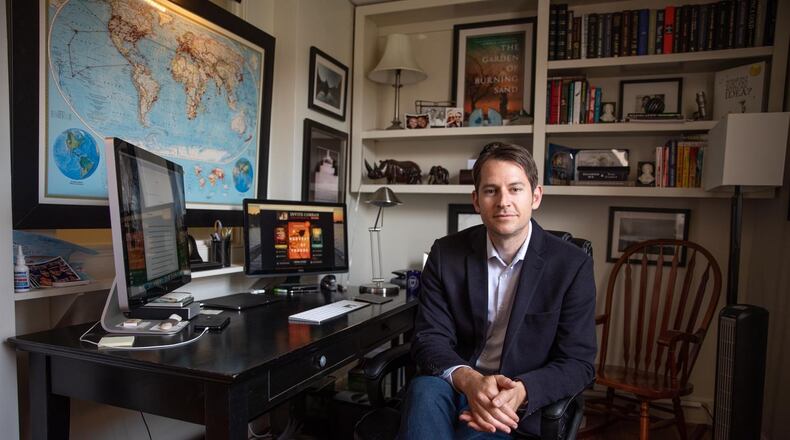It’s hard to imagine a more finely appointed book about hog waste than “Wastelands,” novelist Corban Addison’s real-life legal thriller. Don’t let the subject put you off: This is a David versus Goliath saga that savages the world’s largest pork producers, North Carolina’s Murphy-Brown and its Virginia-based parent company, Smithfield Foods.
Addison portrays them as one large, cult-like enterprise, sinister and cruel. Sustained by legislative chicanery, they bully opponents, destroy the quality of country life and poison the environment.
In a state with almost “one hog per person,” do not doubt the power of the pig: “If humanity suddenly went vegan,” quips the author, “almost every North Carolinian could have a pig for a pet.”
Ground Zero for “Wastelands” is Duplin County, tucked into North Carolina’s flat coastal plain — ”down east,” as its denizen’s say. Infernal during the summer months, its small farming communities have a buzzing vacancy, excruciating to more citified outsiders.
But to those who’ve lived in Duplin and the surrounding counties for generations, especially the poor and Black families whose ancestors have owned the same property since the late 19th century, they love it. And so does Addison, who describes the landscape as “a never ending mural of earth tones framed by blue sky and cotton-boll clouds.”
Gradually, however, in the 1980s, Duplin’s pastoral idyll becomes a mephitic dead zone, thanks to the nightmarish business scheme of an ambitious hog farmer named Wendell H. Murphy.
“The day the first Duplin County farmer became a Wendell Murphy grower,” writes Addison, “was the day the modern hog industry was born.” Under Murphy’s guidance, the region’s quaint “patchwork of small farms” becomes “integrated” into enormous Concentrated Animal Feeding Operations, or CAFOs.
CAFOs “generate an unfathomable amount of waste, equivalent to a city twice the size of New York.” Their disposal method — ”as antiquated as an outhouse” — makes use of collection “lagoons,” which are connected to “giant (spray) guns that shoot liquefied hog waste into the air, leaving it to drift like a cloud on the breeze.” It’s “a putrescent dew.”
Credit: Handout
Credit: Handout
When someone mentions the overwhelming hog stench to Wendell Murphy, he reminds him that it’s the “smell of money.” But one young attorney, after visiting his rural client, maintains that, “The injury these people have suffered … is as clear and present as the diseased air filling his lungs.”
No one living near the CAFOs can enjoy their lives in a way most Americans would take for granted. Elsie Herring, for instance, after decades working in Brooklyn, returns to her quiet girlhood Duplin County home to find her aging mother living in a horrifying Hieronymus Bosch tableau. The same is true for hundreds of families in eastern North Carolina. “Greasy flies … grow fat as bees,” Addison writes. Doomy buzzards perch “atop the plaintiffs’ homes … scratching on roof tiles.”
Of course, there are technological solutions, such as covering the lagoons, but they’re laughed off by the pork industry as too expensive. A study by a University of North Carolina-Chapel Hill epidemiologist concludes that the CAFOs, often positioned in African-American areas, are an example of “environmental racism.”
Herring and many others may be targets, but they refuse to become victims. For years, they seek legal representation, but North Carolina lawyers are too afraid to confront the notoriously vindictive hog industry.
That is, until their complaint lands on the desk at Wallace & Graham, a feisty law firm in Salisbury, North Carolina, near Charlotte, run by Mona Lisa Wallace (“a lifelong Democrat”) and William Graham (“a card-carrying Republican”). Strategically, they’ll sue Murphy-Brown — not the individual hog farmers — and proceed through the federal, rather than state, court system, since Smithfield, Murphy-Brown’s corporate master, is located across the border in Virginia.
The litigations, which are mass action “nuisance” suits, will last years and cost a fortune. The strategies will be complex. “(The) planning operates in 11 dimensions, like string theory,” Addison explains. “There are moves and countermoves to plot.” At any moment, the trials and possible appeals could go sideways. Wallace & Graham will need a “quintessential outside man.”
Enter Utah’s Mike Kaeske in 2016. He’s the gunslinger from out West, “a creature of wind and sky” with “an appetite and aptitude for legal combat.” And it doesn’t take long for this genius advocate to become a true believer, because, he exclaims, “this case is bigger than the law.”
Once Kaeske is in place, the “High Noon” that is “Wastelands” gathers all of its force, balancing cerebral maneuver with an overwhelmingly emotional quest for justice. His stratagems and fearless cross-examinations recommend this book to anyone who might appreciate Wuxia swordplay in a court-of-law.
Like John Grisham, who writes the introduction here, Corban Addison is a crusading attorney whose novels follow in the social realist tradition of “The Jungle,” Upton Sinclair’s 1906 exposé of the meat packing industry.
The inescapable conclusion for the reader of “Wastelands” is that the pork industry’s arrogant obduracy has its source in an intractable corporate hubris that’s like a narcotic: The “Hog Kingdom” simply can’t stop from hurling itself over a cliff in 2020, landing in Richmond’s Fourth Circuit Court of Appeals for a spectacular day of judgment and ruination.
With all of its mastery of legal procedure and modern suspense, Corban Addison’s comprehensive report remains tethered to the plight of the little people, in whose eyes their lawyers can see “the pain, the exhaustion, the years of travail.”
Surprisingly, there’s no desire for revenge among the litigants like Elsie Herring, who “never wished to end the industry, only to redeem it from its excesses … to restore the sanctity of their ancestral land and to pass it along to generations yet to come.” With “Wastelands,” the plaintiffs and their brilliant legal team receive the righteous tribute they deserve.
NONFICTION
“Wastelands: The True Story of Farm Country on Trial”
by Corban Addison
Alfred A. Knopf
464 pages, $28
About the Author
The Latest
Featured



